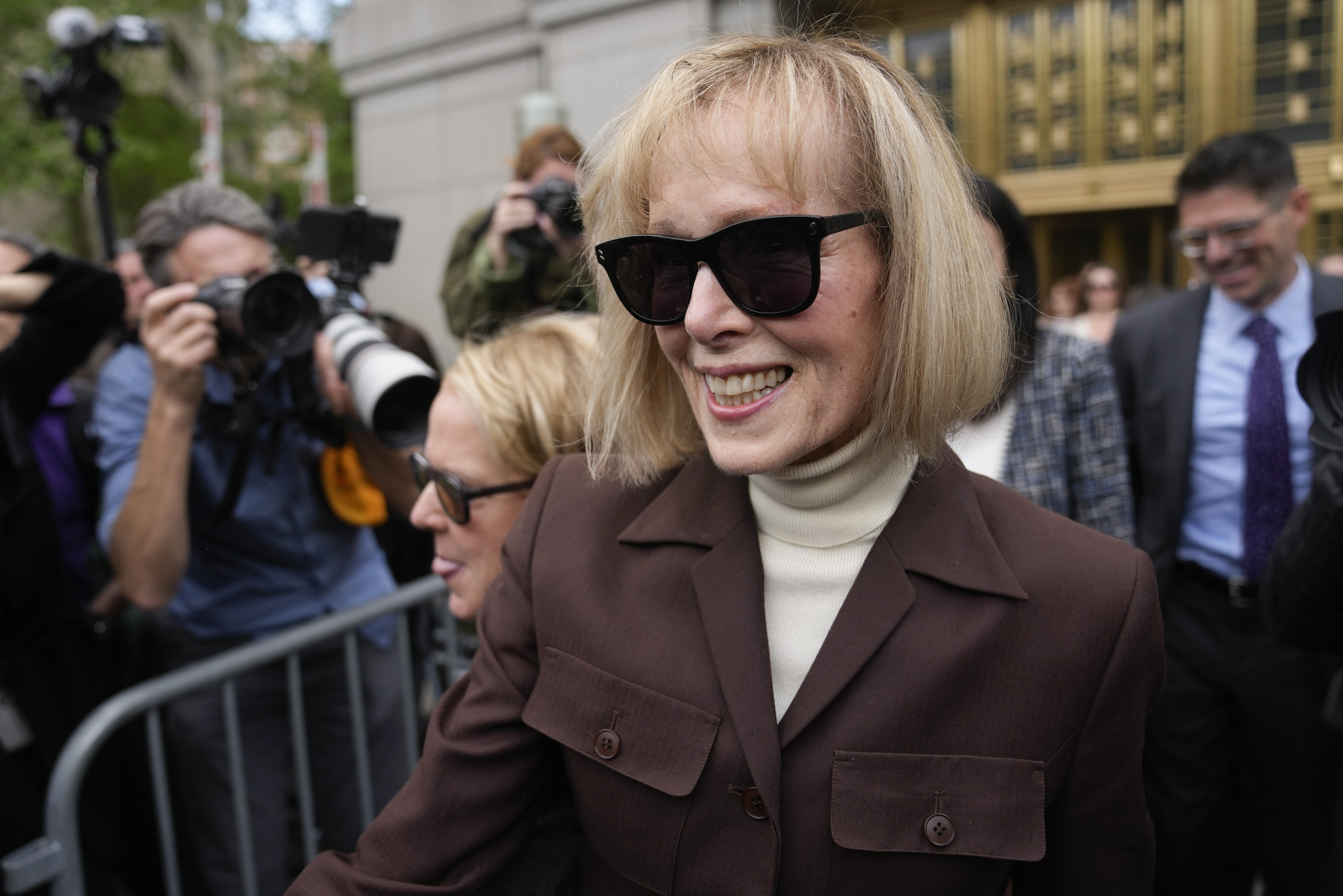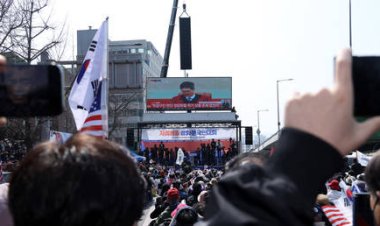A Stunning Result in Trump’s Sexual Assault Trial
A new first — and a new low — for the former president.


Donald Trump’s one term in office produced several presidential firsts in our legal system. He was the first president to be impeached twice, the first president to have been charged with a crime, and now, the first president to be deemed liable for sexual assault by a jury of his peers.
On Tuesday afternoon, a jury in federal court in Manhattan rendered its verdict in a case brought late last year by the writer E. Jean Carroll, who alleged that Trump assaulted her in a dressing room in Bergdorf Goodman in the spring of 1996. The jury concluded within hours that Trump was liable on two civil claims brought by Carroll under New York law — one for battery, and another for defamation based on Trump’s denial of Carroll’s allegations in a post on Truth Social in October 2022. The jury awarded Carroll $5 million. (A separate defamation lawsuit brought in 2019 based on Trump’s denials of Carroll’s claims while in office technically remains pending, thanks to the Justice Department’s ill-advised decision to intervene on Trump’s behalf.)
Before we go further, it is important to recall at the outset the difference between the standards of proof in civil and criminal legal proceedings. In a civil case, the plaintiff typically has to establish that her claims are true under a preponderance-of-the-evidence standard, which essentially just means that it is more likely than not that the plaintiff’s allegations are true. In a criminal case, the government has to establish that the defendant committed the alleged crimes beyond a reasonable doubt, a higher threshold. The centerpiece of Carroll’s case was an alleged crime — sexual assault — but the criminal statute of limitations had long lapsed, so Carroll brought a civil suit, which was resolved under a much more forgiving legal standard than the one that applies in an actual criminal case.
The verdict came, however, with an important qualification: The jury concluded that Carroll did not prove that Trump had raped her, as Carroll had alleged, but that Trump had nevertheless sexually abused her. A finding of rape would have required the jury to conclude that Trump had engaged in non-consensual sexual intercourse with Carroll, but the jury apparently opted to conclude that something short of that — but nevertheless disturbing, illegal and sexually abusive — had happened.
Still, the jury’s verdict in Carroll’s favor is a stunning result, though for people who have been following the case closely, it was not particularly surprising. Carroll had very capable lawyers, who moved their case forward briskly and professionally and kept the pressure on Trump, who tried to dodge the case in pretty much every conceivable way. (Disclosure: I used to work with Carroll’s lead attorney, Roberta Kaplan, and remain friendly with her.)
At the trial, according to reporting from journalists who watched the proceedings, Carroll’s lawyers presented an efficient, well-constructed and coherent case — including testimony from Carroll herself, from two witnesses who spoke with Carroll shortly after her encounter with Trump, from a former Bergdorf Goodman employee who testified that the relevant area in the store at the time matched Carroll’s description, and from another employee of the store who testified that there were no security cameras in the area at the time.
Other witnesses for Carroll included Jessica Leeds and Natasha Stoynoff, who testified that Trump had sexually assaulted them as well. In short, Carroll’s lawyers presented her account, they corroborated it with testimony from other witnesses close to Carroll or who had had their own encounters with Trump, and they addressed head on some of Trump’s lawyers’ dubious claims in defense, which included questioning why there was no video available of an assault that occurred more than 25 years ago.
For their part, Trump’s lawyers struggled to put up much of a defense. In the run-up to the trial, they made multiple long-shot efforts to get the trial adjourned, which the presiding judge — a long-serving, well-regarded judge in the district — repeatedly rejected. At trial, Trump’s lawyers vigorously cross-examined Carroll, though this clearly did not fully persuade the jurors, and Trump’s lawyers put on no witnesses of their own. Trump did not testify in his own defense, even though nothing prevented him from doing so if he had a compelling response to offer to Carroll’s claims. Instead, Carroll’s lawyers played excerpts from Trump’s deposition, which was a debacle that effectively made Trump a witness against himself.
Of course, Trump is not the only politician — he is not even the only president — to face allegations of sexual assault. Former President Bill Clinton, for instance, has also been accused of rape — a point that Trump has raised before in trying to deflect from the more voluminous and broader array of allegations against him. President Joe Biden has also been accused of sexual assault, though that claim faded from mainstream news coverage after questions emerged about the credibility of the accuser. (Both Clinton and Biden have denied the allegations against them.)
Needless to say, every allegation needs to be taken and judged on its own terms, but even if you hate Clinton or Biden, Trump’s case now exists in a distinct realm: The allegations by Carroll were subject to a legitimate and robust adversarial legal process; the case was overseen by a highly competent judge and litigated by competent attorneys on both sides; and the claims were adjudicated by a jury of Trump’s peers pursuant to the law.
It is true that Manhattanites strongly dislike Trump, but there is no indication at this time that the jury did anything less than listen to the evidence and to the judge’s instructions. During the trial, Trump’s lawyers sought to lay the groundwork for an appeal by complaining about alleged bias on the part of the judge, but the arguments raised so far do not appear to be particularly strong.
By itself, the verdict in Carroll’s case is a remarkable and ugly turn of events for Trump, but there are broader implications as well.
Most notably, the verdict serves as at least partial vindication for many other women who have lodged their own allegations against Trump. Trump has been accused of sexual misconduct by dozens of women over the years. Carroll’s allegations were particularly shocking and horrifying, so the case served both as a referendum on Carroll’s specific case — albeit one that the jury resolved in somewhat mixed fashion — but also as a larger proxy battle over Trump’s mistreatment of women over the decades. Whether Trump likes it or not, the verdict lends further support to the credibility of all of those other allegations, which range in their substantive particulars but generally track Trump’s appalling comments on the Access Hollywood tape about how he can do pretty much whatever he wants to women, including assaulting them.
There is, however, little reason to believe that there will be a cascade of litigation following Carroll’s victory, but that appears to have just as much to do with legal constraints as anything else. The statutes of limitations for any other civil and criminal claims based on other alleged sexual misconduct by Trump have probably largely if not entirely lapsed, which is fortunate for the former president. Carroll’s suit, however, managed to emerge for at least two reasons — first, because Trump offered very specific and repeated denials of her allegations even after he left office, and second, because New York passed a law last year that revived civil claims based on sexual assault that would otherwise have been too old to bring in court. Under the circumstances, it is safe to assume that anyone else with a viable legal claim against Trump for comparable conduct would likely have brought it by now.
As a country, we also now have to grapple with the political implications of having a leading presidential contender who has been found liable for conduct as grotesque as sexual assault. Regardless of what one thinks of Trump’s fitness for the presidency, this is a qualitatively new development that could — or at least should — conceivably turn some voters away from him.
In the political arena, Trump might offer some version of his usual bluster to defend himself — perhaps that the judge was systematically biased against him, that Carroll’s lawyer is some sort of covert political operative working on behalf of the Democratic Party, or that he was for some reason or another unable to defend himself in court. None of this is true, though that has never stopped Trump before. Indeed, after the verdict, his presidential campaign claimed: “In jurisdictions wholly controlled by the Democratic Party our nation’s justice system is now compromised by extremist left-wing politics.”
Even before the verdict, there were assessments in the media of the political fallout — or lack thereof — from the case, but there is at least one important reason that the case did not attract more widespread or prominent coverage in the run-up to the trial: Carroll and her lawyers appear to have exercised extraordinary restraint in giving interviews or making public appearances in the months leading up to the trial, perhaps so as not to antagonize the judge, who was particularly concerned about ensuring that the case was decided based on the evidence in the courtroom rather than media coverage. Suffice to say that that may now change — both Carroll and Kaplan should now be free to give interviews if they like — now that the verdict is in.
Still, we should also be prepared for the distinct possibility that the verdict will not significantly shift voters’ preferences. This may be a dispiriting prospect, but so far, his supporters do not appear particularly concerned about his many legal problems, and many of them are likely to hang much on either Trump’s denials or the jury’s rejection of Carroll’s specific claim of rape, even though sexual assault without intercourse is awful enough on its own terms.
That political dynamic could always change, but at least one thing remains true. Trump, while often wrong, has always been right about something that the verdict on Tuesday confirmed once again. The former president is one of a kind — just not for the reason he might like.












